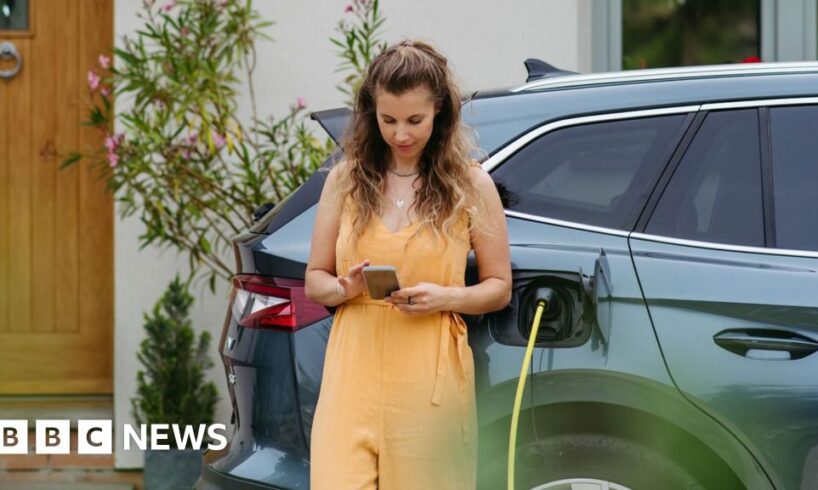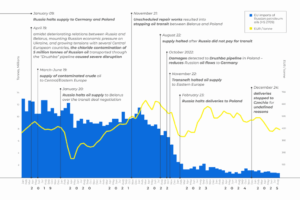
Pritti MistryBusiness reporter
Getty Images
A new tax for electric and hybrid vehicles has been announced by the chancellor in the Budget.
From April 2028, electric car drivers will pay a road charge of 3p per mile, while plug-in hybrid drivers will pay 1.5p per mile, with the rates going up each year with inflation.
The new tax is about “half the fuel duty rate paid by drivers of petrol cars”, according to the government’s independent forecaster, the Office for Budget Responsibility (OBR).
The chancellor also committed to extending the 5p cut in fuel duty until September next year, after which it is set to increase annually by the RPI measure of inflation.
Under the measures, an electric car driver clocking up 8,500 miles in the 2028-29 financial year is expected to pay about £255 – about half the cost per mile that petrol and diesel drivers pay in fuel tax.
Drivers will pay the charge based on how many miles they drive from April 2028, which is then checked annually during an MOT inspection.
According to the OBR, the new per-mile charge is expected to bring in £1.1bn in the 2028-29 financial year, rising to £1.9bn by 2030-31.
However, the amount of money it actually raises will depend on how many people buy electric cars over the next five years, with the report adding the yield “is uncertain”.
The tax applies to UK-registered EVs, regardless of where in the world the vehicle is driven.
EVs registered abroad but are driven in the UK are exempt from the charge.
All new cars will have to be electric or hybrid from 2030, when a ban on the sale of new petrol and diesel cars comes into force. But some in the industry argue this new tax could make electric cars less appealing.
The OBR said the new charge was “likely to reduce demand for electric cars as it increases their lifetime cost”.
“To meet the mandate, manufacturers would therefore need to respond through lowering prices or reducing sales of non-EV vehicles,” it added.
Overall, the charge is forecast to result in about 440,000 fewer electric car sales, though other government policies could help offset around 320,000 of those.
Under the Vehicle Excise Duty, which became payable on EVs for the first time this year, a tax for people buying luxury electric cars will rise in April 2026 from £425 to £440 per year for vehicles costing more than £50,000 – an increase from the previous £40,000 threshold.
Fuel duty has not risen since April 2010.
However, from September the 5p cut will be “reversed through a staggered approach”, the OBR has outlined.
The RAC’s head of policy, Simon Williams, said the fuel duty freeze was a “relief” but it would be “very short-lived given the staggered increase from next September”.
“Without the discount, drivers would still be paying more for a litre of petrol than they were prior to Russia’s invasion of Ukraine in February 2022, which sent pump prices rocketing to record levels.”
He said a new “Fuel Finder” tool, launching in early 2026, would be a big help for motorists making it easier for them to compare fuel prices at different petrol stations.
Stephen Walton
Stephen Walton says he feels penalised for having bought an electric car
Stephen Walton, 46, in Crewe bought an electric car for his wife in July 2023 because “she wanted to do what’s right by the environment”.
He said he now thought owning an EV “just doesn’t make financial sense” given the higher purchase price and more rapid depreciation levels, adding that a pay-per-mile tax “will literally be the final straw”.
“It’s just a nightmare,” he said. “I’ve paid more to do the right thing and I’m being penalised for it.
“This will be my first and last electric vehicle because there are no fiscal perks to being an EV car driver.”
Car manufacturer Ford and the Society of Motor Manufacturers and Traders (SMMT) industry body both said the new tax was “the wrong measure at the wrong time”.
Ford said the Budget had conveyed “a confusing message” in the government’s attempt to get motorists to switch to electric vehicles.
The SMMT welcomed the government’s pledge to invest £1.3bn to encourage EV use but warned the pay-per-mile charge would “undermine demand”.
The Renewable Energy Association described the tax as a “knee-jerk” charge.
“The fairest approach would be for all types of vehicles to be included – and this should reflect the environmental impact of their vehicle – in principle, polluters should pay and a higher impact should be reflected in increased costs,” said Frank Gordon, head of policy at the group.
Delvin Lane, chief executive of InstaVolt which develops and installs chargers, said the tax could discourage people from switching to electric cars.
He said drivers without home chargers were already paying more in tax for public charging, and rural and low-income drivers would be disproportionately affected.
“We urge the government to work closely with the charging and automotive sectors to co-design a fair, future-proof system that maintains incentives to switch to zero-emission vehicles while ensuring sustainable road taxation.”
Edmund King, president of the AA, said: “The Budget has put drivers at a fork in the road with the chancellor announcing major tax proposals for EV owners.
“Drivers fully understand that the government needs to get the balance right between raising cash for roads investment, whilst ensuring it doesn’t slow down the transition to electric cars in order to meet environmental targets.”




